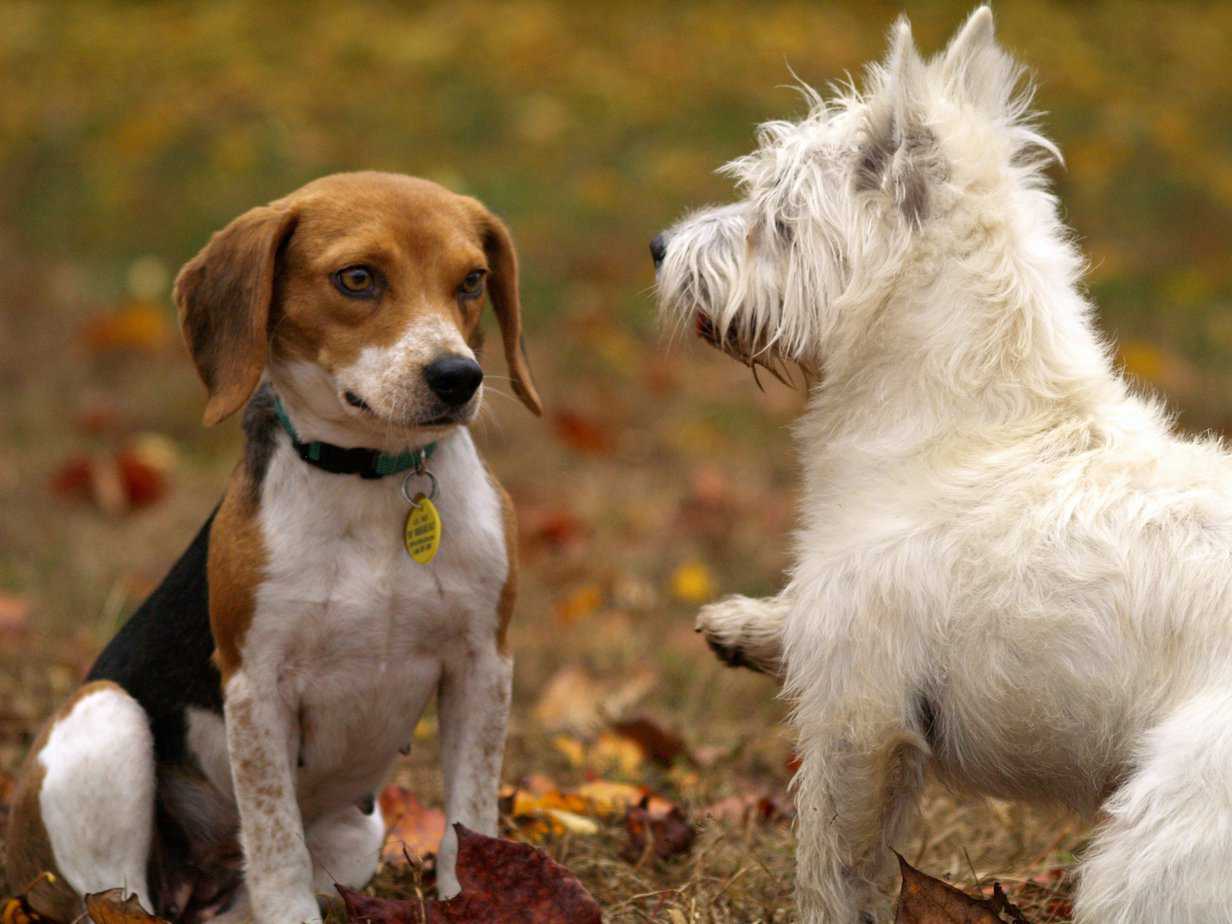Which dog breed are you?
Have you ever wondered which dog breed are you? Do this quiz to find out!
To do the quiz click HERE!
Click here for more!

Coat colours accepted by the AKC are orange and white, lemon and white, red and white or tri-coloured. Black, white and tan tri-coloured coats are the most common. Their medium-length coat is smooth, hard and close. It requires minimal brushing and only needs washing occasionally.
Friendly, loyal, loving and playful are all qualities that make them excellent family pets. Homes with other dogs, pets and children can all welcome the Beagle as part of the family. They require minimal socialization and actually enjoy the companionship of other pets and their family. A very energetic breed, the beagle needs a home that will give them plenty of play time, exercise and regular walks. When outside they should be in a fenced in yard and a leash should be used for walks as they have a tendency to explore and follow scents. They make good watchdogs as they will let you know if someone is at the door by barking, but they are naturally friendly with strangers, so don’t expect them to be good guard dogs.
Originating in England, this scent hound was bred for hunting rabbits and quails. They would often hunt in packs or pairs, but can also hunt well alone as well. They have an excellent sense of smell which makes them good at tracking and as narcotics dogs. Today they are mainly seen as companion dogs in the United States, but they are also used as hunting dogs.

A breed with such a friendly, loving nature is perfect for just about any family dynamic. Because of their high energy level and need for regular exercise, they work best with active families or those that have a yard where they can have plenty of time to roam and run. If you are looking for an affectionate breed that enjoys family companionship and loves to play, then the Beagle is the perfect dog for you.
Thanks for reading! For more click here.
Are strawberries toxic for dogs
Demystifying Anal Gland Issues in Dogs: Your Comprehensive Guide from the American Kennel Club
The Benefits of Adopting a Dog – Finding Your Furry Friend
Sometimes we think that owning a pet is a great way to add to our family or that we are doing our pet a service by saving them from an uncertain future. These alone are great reasons to own a pet; however, there are even more reasons to join the ranks of pet ownership.
* Mentally
* Emotionally
* Physically
* Socially
While these are all important ways a pet can benefit you, improving mental health is high on the list. There are several individuals who benefit mentally from owning a pet. Of these, the elderly are worth a special mention. For many elders, living alone and feeling isolated are just a part of what they are experiencing during this stage of their lives.
Depression, Anxiety, and Panic
We all know that feeling isolated can lead to many other ailments. Of course, deterioration of the physical body is one of the downfalls of not getting out and socializing. However, mental deterioration in the form of panic, anxiety attacks, and depression can set in for an elder who is isolated. Those feelings are alleviated with the company of a pet.
Having a pet can improve the mental status of an elder in many ways.
A Feeling of Vitality
An elder who owns a pet is more likely to have feelings of wellbeing, peace, and a sense of vitality. A feeling that there is someone who needs caring for and tended to can make a huge difference, especially one who may have just recently lost a spouse they were caring for at home.
When an elder loses a spouse, sometimes they lose their sense of purpose along with them. Owning a pet is a wonderful way to get that sense of purpose back into their lives.
Socialization
Feeling isolated is one of the worst things an elder can experience; however, owning a pet can alleviate that sense of isolation. There are still some groomers who come to the home to groom pets and this gives the opportunity for the elder to have someone to share socialization.
Walking a dog also offers the opportunity to get out and about for an elder who is capable of doing so. Sometimes hiring a young teen in the area to come, walk the dog, and visit with the elder is a win/win situation all the way around. The teen may pick up some community service work and a few dollars as well.
I hope you enjoyed this post:-Ways That Pets Can Improve Your Mental Health. For more posts please see https://bestbuddyforever.com
Are strawberries toxic for dogs
Demystifying Anal Gland Issues in Dogs: Your Comprehensive Guide from the American Kennel Club
The Top Dog Breeds Recognized by the American Kennel Club
Dog Training 101: Train Your Pup

We all know the benefits of giving to charity, whether it is by check or by our presence at a volunteer event. However, did you know that there are so many hidden benefits to giving back to domesticated animal charities?
We do not always see how our dollars or our time can affect the lives of others; however, helping out with pets is a sure-fire way to help others and gain some benefits for you as well.
Helping Pets
There are many ways to help pets: donating your money, of course, and donating your time at animal shelters. Another amazing way to help pets is to match available pets with potential homes. Matching an available domesticated animal with a new family has great rewards and benefits.
When you see a domesticated animal through the adoption process and place it in a loving home, you have helped two-fold. You have helped a family gain a new family member and you have helped save a pet from an unfortunate outcome.
Simply advocating on behalf of a pet by passing on vital information on spaying and neutering can help control the domesticated animal population.
Helping Humans
There are so many ways that a domesticated animal helps a human being. First of all, there is companionship. Having a pet means that it becomes a new part of the family.
Aside from companionship and becoming a new member of the family, pets offer great strength to humans on a different level. Sometimes, pets assist humans with the day-to-day living that most healthy individuals take for granted.
When you volunteer your time to train an assistance dog, an alert dog, or a seeing-eye dog, you take time to help a fellow human being. Dogs can assist humans in so many ways other than just for companionship:
* Autism
* Diabetic assist
* Heart assist
* Depression
* Anxiety and panic
* Hearing dogs
When you take the time and trouble to volunteer to help pets, you take the time and trouble to help other human beings.
The benefits and rewards are numerous. You get to save a domesticated animal from an unfortunate existence; you get to help other human beings with health (both mental and physical) ailments. However, most of all, you get to feel good.
Bottom line is that when you give back, you feel good. Feeling good through giving back radiates from you to others and others can notice that vibe. It is a win/win situation all the way around – both for you, the pets, and the other human beings you serve.
I hope you enjoyed this post:-The Benefits of Giving Back to Pet Charities. For more posts please see https://bestbuddyforever.com

The Beagle breed – Friendly Loyal And Loving
Information about Goldendoodle.
Pets are a great addition to your home. They offer many social benefits to kids. Whether you have one child or more than one, a pet can increase your quality of life.
What is it about domesticated animals that make them so valuable? You see them in nursing homes and assisted living facilities. People seem to improve health when domesticated animals are around.
Children can also profit from living with a pet. Physically, they can improve their health by walking their dog and spending time playing outside. There are also socialization skills that can be learned from exposure to a pet.
So, what are the benefits to children? Here are a few reasons to own a pet.
* Conversation starter – It can be awkward making new friends. With a pet, there is something with which to ease into a conversation. Kids can break the ice by talking about your child’s new pet.
* A way to meet new people – People with pets are more likely to talk to each other. If you pass with a dog in the park, you will say hello and might even stop for a few words about your animals as they sniff each other out. This is a good social experience for kids of all ages.
* Offer companionship – For families with one child, having no siblings can hinder some social interaction. Having a pet offers companionship to your child. They have someone to confide in and talk to. Pets are quite sensitive to the attitudes and needs of their owners.
* Understand various forms of communication – Since animals can’t talk, it is up to the owners to learn to communicate with them. This can increase their understanding of non-verbal communication between people which can help them in all types of social situations.
* Gain self-confidence – Caring for something other than themselves can increase their belief in their own abilities. Self-confident kids are more productive in school and in social situations. Domesticated animals give unconditional love which bolsters a kid’s esteem.
* Reduce stress – Stress is not just an adult condition. Children experience stress as well. Owning a pet can lower blood pressure and cholesterol. During test-taking time or social problems, a pet can ease any discomfort.
* Sounding board – When you need to talk, your pet will be right there. They exhibit unconditional love to their owners, reinforcing that they care. And, domesticated animals don’t talk so they won’t reveal any secrets.
* Learning to play – Domesticated animals, especially dogs, have a real need for exercise. Kids can run, laugh, tumble and cuddle with their pet. Even if they are an only child, they can learn how to share and take turns by spending time with their pet.
Pets can help your child to socialize better from an earlier age.
I hope you enjoyed this post:-Social Benefits of Children Owning Pets. For more posts please see https://bestbuddyforever.com

If you would like to read more posts on Social Benefits of Children Owning Pets, then please comment on post and advice us.
The Beagle breed – Friendly Loyal And Loving
Information about Goldendoodle.




